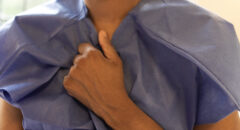
Post-mastectomy chest discomfort is common due to muscular tension. Fortunately, stretching and exercising help reduce stiffness during recuperation.
Watching for indications of infection and taking care of your mental and emotional health after a mastectomy are equally important.
Is Chest Tightness After A Mastectomy Normal?
Mastectomy often causes chest tightness. Muscle stiffness after a mastectomy may occur because:
- your muscles shrink, pulling on your chest scar tissue grows as your body heals
- muscles may strain during breast restoration (but this is often temporary)
- joint pain (swelling)
- muscular contractions
Post-mastectomy pain syndrome affects the chest and arms (PMPS). This problem results from nerve injury during the surgery.
PMPS occurs in 20–30 percent of mastectomy patients. Symptoms include numbness, tingling, itching, and shooting or pricking chest or arm discomfort.
After mastectomy, capsular contracture is a typical adverse effect of breast implants. When scar tissue grows around the implant's soft substance, the breast might become rigid or appear different.
If scar tissue develops, you may require another treatment to remove or replace the implant.
RELATED: Loving Your Body After a Mastectomy
How Long Does Tightness In The Chest Last After Mastectomy?
After a mastectomy, take some time off.
First, expect to stay in the hospital for one to two nights. During this period, physicians and nurses will monitor your recuperation, check your bandages, and address any concerns.
Many people's function returns to normal after four weeks at home. You may require months to recuperate after breast reconstruction surgery.
You and your carers will get recuperation instructions from your healthcare team. This might include advice on: care for your dressings or bandages, washing and showering, indications of infection, when to contact a doctor or nurse, and activity limits.
Ask your physicians and nurses about what you can and can't do while recovering. Ask questions during your follow-up visit.
Exercises And Stretches For Chest Tightness
After surgery, you may start chest tightness exercises three to seven days later. But first, see your doctor. Physicians often prescribe home and physical rehabilitation activities.
They may suggest elevating your arms to shoulder height and then lowering them, using your afflicted arm to brush your hair, bathe, or get dressed, and doing deep breathing exercises.
Lifting your arm and bending your elbow to touch your shoulder on the same side and repeating on the other side raising your arm and opening and closing your hand:
- Stretching your shoulders, arms, and chest may also assist.
- Exercise tips from the American Cancer Society include:
- repeat exercises 5–7 times (a physical therapist can help you develop proper form)
- wear loose, comfortable clothes and supportive shoes
- breathe deeply throughout each workout
- warm up beforehand by having a hot shower or exercising twice a day
RELATED: 6 Things to Consider Before Getting Breast Reconstruction
How Long Does It Take To Feel Normal After A Mastectomy?
If you underwent reconstructive surgery, it may take months to return to typical activities. You may still feel chest tightness around your scars, but stretching and exercise should help.
Talk to a doctor if you're still not feeling better after many weeks. You may not be healing adequately.
Check the surgery site for symptoms of infection, such as:
- scars that are sensitive, swollen, or warm to touch, redness in the region, fluid (discharge) from the wound, feeling generally sick, a fever
- if you suspect an infection, contact your doctor immediately.
Mastectomies may also affect your mental health. Depression, anxiety, sleeplessness, and low self-esteem are prevalent.
A 2022 study indicated that partial mastectomy (removing one breast) was associated with a higher incidence of mental health issues, including melancholy and anxiety, than complete mastectomy (both breasts removed).
They also observed that people over 50 had comparable rates of sadness or anxiety regardless of surgical type.
If you have depression, anxiety, or other mental health issues, speak to a doctor or counselor. Treatments for mental illness may boost your health.









